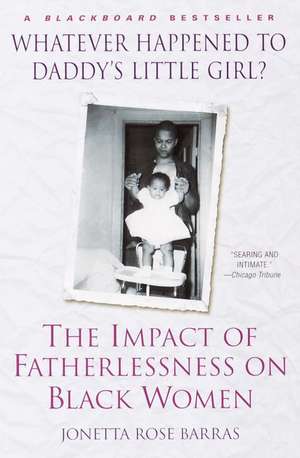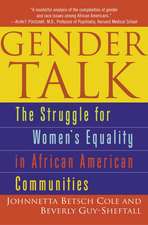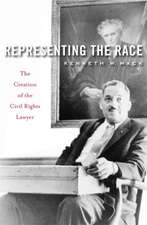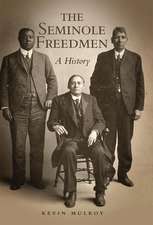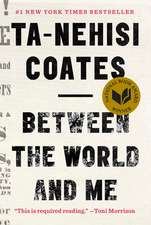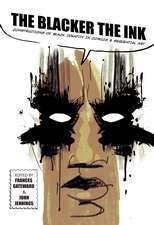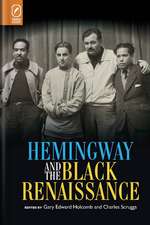Whatever Happened to Daddy's Little Girl?: The Impact of Fatherlessness on Black Women
Autor Jonetta Rose Barrasen Limba Engleză Paperback – 31 dec 2001
Passionate and shockingly frank, Whatever Happened to Daddy's Little Girl? is the first book to explore the plight of America's fatherless daughters from the unique perspective of the African-American community. This brilliant volume gives all fatherless daughters the knowledge that they are not alone and the courage to overcome the hidden pain they have suffered for so long.
Preț: 102.40 lei
Nou
Puncte Express: 154
Preț estimativ în valută:
19.59€ • 20.51$ • 16.31£
19.59€ • 20.51$ • 16.31£
Carte disponibilă
Livrare economică 10-24 martie
Preluare comenzi: 021 569.72.76
Specificații
ISBN-13: 9780345434838
ISBN-10: 0345434838
Pagini: 276
Dimensiuni: 140 x 207 x 15 mm
Greutate: 0.25 kg
Ediția:Trade Pbk.
Editura: One World/Ballantine
ISBN-10: 0345434838
Pagini: 276
Dimensiuni: 140 x 207 x 15 mm
Greutate: 0.25 kg
Ediția:Trade Pbk.
Editura: One World/Ballantine
Notă biografică
Jonetta Rose Barras is the author of the critically acclaimed book The Last of the Black Emperors: The Hollow Comeback of Marion Barry in the New Age of Black Leaders. She is also a columnist for the Washington Times and former associate editor of the Washington City Paper. Her writings have also appeared in the Washington Post, USA Today, American Visions, The New Republic, and The New Democrat. She has appeared as a commentator for CNN, C-SPAN, and PBS and is widely considered one of the freshest female voices speaking for the African-American community.
From the Hardcover edition.
Extras
Open the world to me it’s been closed dark, flat i kept thinking i would fall off if i went to the edge but there was nothing only a circle, waiting to repeat itself and me wondering why every little girl needs a daddy before she can ever become a woman for some man to love. —Excerpted from “Father,”
The Corner Is No Place for Hiding
1. STRANGE FRUIT
We faced the Gordon Plaza Apartment complex on St. Ferdinand Street. A rust-colored, four-inch band of wood raced around the middle of the mustard-painted buildings, reminding me of the dirty ring my two sisters and I left inside the silver metal tub when my aunt Laurita bathed us all together. During those days in the 1950s we were refugees, finding pleasure in our escape from the New Orleans summer, teachers, watchful grandparents, and an overworked mother. Although the weather in Dallas, Texas, wasn’t much better, Aunt Laurita was worth the trip. She had no children of her own and, along with Uncle Cephas, spoiled us rotten.
After our baths in her makeshift tub, she invariably dressed us in identical outfits, as if we were triplets. She pressed our hair down against our heads with globs of Vaseline petroleum jelly, pulling it back into a traditional bun—a symbol, she thought, of southern gentility and Creole aristocracy. My hair was always the most unruly. But Aunt Laurita never surrendered and never failed to bring it under her control—a boot-camp sergeant whipping a new recruit into shape. Years later, partially because of what she accomplished, I came to call Vaseline petroleum jelly black folks’ elixir. We used it for everything: unruly hair, ashy legs, diaper rash, and makeup removal. There wasn’t a role it couldn’t perform. It had magical properties.
Such memories crowded my mind as my older sister and I traveled the perimeter, marching like soldiers in formation, searching for a point of entry into the apartment complex. I had not spoken a word to her since leaving the car. I had become lost in the day that sent me to this place.
Spanish Moss
“Do you want to see your father?” my mother had asked when she telephoned me that day from New Orleans; I was living in Washington, D.C. The incessant ringing of the phone had intruded on my day, and I was slightly irritated when I picked up the receiver. The day was hot, and I was forlorn. Even now I remember that 1988 season as the Summer of My Discontent. I saw nothing in it to praise, except my son’s graduation from high school—everything else burdened me. To begin with, my temperamental disposition and legendary temper had gotten me into trouble yet again: I was fired from my job as city editor at the Washington Afro-American newspaper, after attempting to quarter the publisher with my acid tongue; I had no immediate employment options. To add to the misery, I had just broken up with my boyfriend. In the middle of all this, my mother called asking what I considered to be the dumbest question.
I couldn’t remember the last time I had seen Bill. Latin-looking and short, with shockingly dark, curly black hair, mustache, and a warm brown complexion, which over the years grew pallid with his drinking, Bill was quite handsome. But he never belonged to me. He was the possession of my brother and my older sister. They seemed to worship him, and he them. Once when I was nearly junior-high-school age, I remember his visiting our home. The three of us, my brother, older sister, and me, were in the backyard. They seem to burst out in smiles when he arrived. He had come with another, taller person in tow—his older son by a previous marriage or a similar arrangement, I never learned which. He drew away from me. There was no smile on his face for me as there had been for my siblings. He was cold and distant. I did not know why, but at that moment I felt awful, as if something were seriously wrong with me, as if I did not belong in their family. I was an outsider, with no redeeming qualities. I remained in the corner, removed from the affection, accepting that he was my father but knowing that my embrace would never be reciprocated.
“For what reason? Why would I want to see Bill?” I asked, knowing that my mother, too, must have remembered that encounter.
“No, not him; I mean your real father,” she replied casually. I fell silent. The shock reached more deeply inside of me than if I had been told of my best friend’s death. I grabbed for a chair, thinking that at the very least I would faint.
Why would my mother deliver such earth-shattering, life-altering news by telephone? There, with unimaginable ease, as if she were suggesting numbers to play for the lottery, my mother told me Bill was not my father—he was only her husband. She had made flesh and whole my feelings about Bill. I had not imagined the emotional abandonment. The chasm between us during my childhood—it had been real. He had always felt instinctively I was not his—except in name only. Although, for a time, he had tried to make himself my father, he could not. But none of this had been explained to me. All I had known was that I was unwanted.
My mother made no attempt to soften the blow, to explain the complexities and contradictions in which she had wrapped my life for thirty-seven years. If anyone else had been so cavalier, I would have mortally wounded them, releasing a missile of profanities. Instead, I wondered how she could be so remote, so insensitive. How could she not understand the nature of the assault she had just made?
The deception she harbored had its roots in the place where she and I were born; it endorsed this kind of charade. Like the South captured in John Berendt’s Midnight in the Garden of Good and Evil, New Orleans is a place of layers. All the lines and edges are blurred. There is no way to discern the beginning or end of anything. The Spanish moss, which hangs from trees, is as symbolic as the aboveground cemeteries. Nothing is ever clearly viewed, and nothing is ever completely buried. Not unlike Berendt’s Savannah, New Orleans is a place where deceit is a natural occurrence, accepted, like voodoo, as part of the city’s historical and cultural tapestry. To know the facts is not necessarily to know the truth. My grandmother always said that not even what is seen with the naked eye is to be completely believed.
In New Orleans, miscegenation and polygamy are as commonplace as the city’s famous beignets and coffee with chicory. Some years ago, after learning the truth about my birth, I discovered another deceitful thread in my New Orleans family tapestry: I learned that two people who I thought were my aunt and uncle were actually cousins. They had challenged a societal taboo and done the unthinkable thing of having a child together.
When I was born, in October 1950, the law required that my mother give me her name. It was Barras—the name of the man to whom she was married. It hurts me to admit this, but my mother was guilty of adultery. And if that is not true, then the man she called my biological father had been guilty of rape. The choices weren’t pleasant. Bill and my mother had been married when I was born; four years later, they legally separated. Both of them were Catholic, so they did not seek a divorce. They remained married for twenty-six years—although they had long since stopped living together as husband and wife. None of this history offered comfort or tolerable explanation for what my mother did. These were simply the facts. The truth is slipperier.
“He wants to see you,” my mother continued.
He had called my grandfather, asking him to find out where I was and to give him my telephone number. I could not believe my grandfather had been part of the conspiracy that denied me the truth; I nearly worshiped that man. Once, I confessed to my mother that he was the only person in our family over whose death I would shed a tear. I considered him the most honest person I knew. Sometimes an adult doesn’t discard a child’s vulnerability and gullibility. I plead guilty to failing to discard my idealized notion of my grandfather, which may be why, years later, when my grandfather’s own skeletons were uncovered, I was the only person shocked by the discovery.
My mother balked when she received my grandfather’s call. But he pushed: “It’s the man’s child; he has a right to see her.”
“So, do you want to see him?” she asked me.
I grew angrier at her impatience. How could anyone be expected to answer such a question in a matter of seconds, and over the telephone? I fell into a real funk, but restrained myself.
If I said no, I thought, then I would close the door forever. If I said yes, I didn’t know what Pandora-type box I was opening: Who was this man? What baggage would he bring? Could I handle the consequences of allowing him, after all these years, to enter my life? In reality, fate gave me no choice. I had to say yes.
I was going to Mississippi, via New Orleans, later that month to attend the high-school graduation of my son, Umoja. “I’ll see him when I come, then,” I said, attempting to close the conversation before I exploded. A note of resignation and disappointment that I was agreeing to my father’s request seemed to tinge my mother’s voice. But she accepted my answer and hung up. I held the receiver in my hand, the silence filling the room. I was dazed. I seethed over the abrupt appearance of this unexplored past. The longer I sat in the chair at the dining table of my small two-bedroom apartment, the more enraged I became.
I had been subjected to a bushel of lies. I was the victim of unspoken covenants that had kept me in darkness. At that moment, I detested the southern culture that permitted the truth to be carved, diced, and smothered in a thick, albeit sweet, gravy. For the next few weeks, I gave myself no peace. I wondered about this father I never knew existed: How did he and my mother come to know each other? How will I receive him, and he me? Why did it take all of this time for him to ask about me? What should I wear? What should I call him—Daddy?
Plexiglas (and Other Obstructions)
A row of squat gray and burgundy buildings alongside the Gordon Plaza Apartments constituted the neighborhood shopping center and billboarded the Desire Community Housing Corporation, the Sav-More Supermarket, and Jackson’s Beauty Salon. The center teased like an aging prostitute unwilling to accept her mortality. My sister and I halfheartedly yielded to its funky allure, if only out of curiosity. We found in its armpit what we had been seeking: a sign directing us to the main office. Upon our arrival, we were greeted by a plus-size African American woman who was seated at a desk. She buzzed us through a gate, but not into the office. We were denied the opportunity to see her and to hear her voice without obstruction; the entire office was shielded by Plexiglas.
The bullet-proof plastic has become standard construction material in an America crowded by narcissism and so overwhelmed by the concept of intimacy that it regards Bazooka bubble-gum wrappers, baseball cards, computers, E-mail, and television more inviting than the human touch. Perhaps this too-pervasive reality, more than anything else, is the reason that at the end of the twentieth century there transpired an epidemic of children killing children; children killing their classmates; children killing their parents. Everyone has forgotten how to love.
Once upon a time, we met one another and talked face-to-face; even foes were obliged to confront the human form directly. Those fighting the duel in the eighteenth and nineteenth centuries behind New Orleans’s Saint Louis Cathedral stood nose to nose before measuring off the distance and firing their weapons. This was, of course, before the H-bomb, chemical and biological warfare, AK-47s, Glocks, the killing fields of the twentieth century, and the World Wide Web.
Plexiglas. I hate the stuff. I was so disturbed by its presence that day at the Gordon Plaza Apartments that I could not fix my mouth to say anything. My sister took charge. She told the plus-size office attendant who we were looking for. “Is he expecting you?” she asked. When we replied affirmatively, she picked up the telephone either to notify him that we were on our way up or to confirm that we were not lying—I wasn’t sure which. “Apartment 235,” she said, giving us hazy directions and leaving us even more confused. Nevertheless, showing our home training, we said thank you and took our leave.
The Corner Is No Place for Hiding
1. STRANGE FRUIT
We faced the Gordon Plaza Apartment complex on St. Ferdinand Street. A rust-colored, four-inch band of wood raced around the middle of the mustard-painted buildings, reminding me of the dirty ring my two sisters and I left inside the silver metal tub when my aunt Laurita bathed us all together. During those days in the 1950s we were refugees, finding pleasure in our escape from the New Orleans summer, teachers, watchful grandparents, and an overworked mother. Although the weather in Dallas, Texas, wasn’t much better, Aunt Laurita was worth the trip. She had no children of her own and, along with Uncle Cephas, spoiled us rotten.
After our baths in her makeshift tub, she invariably dressed us in identical outfits, as if we were triplets. She pressed our hair down against our heads with globs of Vaseline petroleum jelly, pulling it back into a traditional bun—a symbol, she thought, of southern gentility and Creole aristocracy. My hair was always the most unruly. But Aunt Laurita never surrendered and never failed to bring it under her control—a boot-camp sergeant whipping a new recruit into shape. Years later, partially because of what she accomplished, I came to call Vaseline petroleum jelly black folks’ elixir. We used it for everything: unruly hair, ashy legs, diaper rash, and makeup removal. There wasn’t a role it couldn’t perform. It had magical properties.
Such memories crowded my mind as my older sister and I traveled the perimeter, marching like soldiers in formation, searching for a point of entry into the apartment complex. I had not spoken a word to her since leaving the car. I had become lost in the day that sent me to this place.
Spanish Moss
“Do you want to see your father?” my mother had asked when she telephoned me that day from New Orleans; I was living in Washington, D.C. The incessant ringing of the phone had intruded on my day, and I was slightly irritated when I picked up the receiver. The day was hot, and I was forlorn. Even now I remember that 1988 season as the Summer of My Discontent. I saw nothing in it to praise, except my son’s graduation from high school—everything else burdened me. To begin with, my temperamental disposition and legendary temper had gotten me into trouble yet again: I was fired from my job as city editor at the Washington Afro-American newspaper, after attempting to quarter the publisher with my acid tongue; I had no immediate employment options. To add to the misery, I had just broken up with my boyfriend. In the middle of all this, my mother called asking what I considered to be the dumbest question.
I couldn’t remember the last time I had seen Bill. Latin-looking and short, with shockingly dark, curly black hair, mustache, and a warm brown complexion, which over the years grew pallid with his drinking, Bill was quite handsome. But he never belonged to me. He was the possession of my brother and my older sister. They seemed to worship him, and he them. Once when I was nearly junior-high-school age, I remember his visiting our home. The three of us, my brother, older sister, and me, were in the backyard. They seem to burst out in smiles when he arrived. He had come with another, taller person in tow—his older son by a previous marriage or a similar arrangement, I never learned which. He drew away from me. There was no smile on his face for me as there had been for my siblings. He was cold and distant. I did not know why, but at that moment I felt awful, as if something were seriously wrong with me, as if I did not belong in their family. I was an outsider, with no redeeming qualities. I remained in the corner, removed from the affection, accepting that he was my father but knowing that my embrace would never be reciprocated.
“For what reason? Why would I want to see Bill?” I asked, knowing that my mother, too, must have remembered that encounter.
“No, not him; I mean your real father,” she replied casually. I fell silent. The shock reached more deeply inside of me than if I had been told of my best friend’s death. I grabbed for a chair, thinking that at the very least I would faint.
Why would my mother deliver such earth-shattering, life-altering news by telephone? There, with unimaginable ease, as if she were suggesting numbers to play for the lottery, my mother told me Bill was not my father—he was only her husband. She had made flesh and whole my feelings about Bill. I had not imagined the emotional abandonment. The chasm between us during my childhood—it had been real. He had always felt instinctively I was not his—except in name only. Although, for a time, he had tried to make himself my father, he could not. But none of this had been explained to me. All I had known was that I was unwanted.
My mother made no attempt to soften the blow, to explain the complexities and contradictions in which she had wrapped my life for thirty-seven years. If anyone else had been so cavalier, I would have mortally wounded them, releasing a missile of profanities. Instead, I wondered how she could be so remote, so insensitive. How could she not understand the nature of the assault she had just made?
The deception she harbored had its roots in the place where she and I were born; it endorsed this kind of charade. Like the South captured in John Berendt’s Midnight in the Garden of Good and Evil, New Orleans is a place of layers. All the lines and edges are blurred. There is no way to discern the beginning or end of anything. The Spanish moss, which hangs from trees, is as symbolic as the aboveground cemeteries. Nothing is ever clearly viewed, and nothing is ever completely buried. Not unlike Berendt’s Savannah, New Orleans is a place where deceit is a natural occurrence, accepted, like voodoo, as part of the city’s historical and cultural tapestry. To know the facts is not necessarily to know the truth. My grandmother always said that not even what is seen with the naked eye is to be completely believed.
In New Orleans, miscegenation and polygamy are as commonplace as the city’s famous beignets and coffee with chicory. Some years ago, after learning the truth about my birth, I discovered another deceitful thread in my New Orleans family tapestry: I learned that two people who I thought were my aunt and uncle were actually cousins. They had challenged a societal taboo and done the unthinkable thing of having a child together.
When I was born, in October 1950, the law required that my mother give me her name. It was Barras—the name of the man to whom she was married. It hurts me to admit this, but my mother was guilty of adultery. And if that is not true, then the man she called my biological father had been guilty of rape. The choices weren’t pleasant. Bill and my mother had been married when I was born; four years later, they legally separated. Both of them were Catholic, so they did not seek a divorce. They remained married for twenty-six years—although they had long since stopped living together as husband and wife. None of this history offered comfort or tolerable explanation for what my mother did. These were simply the facts. The truth is slipperier.
“He wants to see you,” my mother continued.
He had called my grandfather, asking him to find out where I was and to give him my telephone number. I could not believe my grandfather had been part of the conspiracy that denied me the truth; I nearly worshiped that man. Once, I confessed to my mother that he was the only person in our family over whose death I would shed a tear. I considered him the most honest person I knew. Sometimes an adult doesn’t discard a child’s vulnerability and gullibility. I plead guilty to failing to discard my idealized notion of my grandfather, which may be why, years later, when my grandfather’s own skeletons were uncovered, I was the only person shocked by the discovery.
My mother balked when she received my grandfather’s call. But he pushed: “It’s the man’s child; he has a right to see her.”
“So, do you want to see him?” she asked me.
I grew angrier at her impatience. How could anyone be expected to answer such a question in a matter of seconds, and over the telephone? I fell into a real funk, but restrained myself.
If I said no, I thought, then I would close the door forever. If I said yes, I didn’t know what Pandora-type box I was opening: Who was this man? What baggage would he bring? Could I handle the consequences of allowing him, after all these years, to enter my life? In reality, fate gave me no choice. I had to say yes.
I was going to Mississippi, via New Orleans, later that month to attend the high-school graduation of my son, Umoja. “I’ll see him when I come, then,” I said, attempting to close the conversation before I exploded. A note of resignation and disappointment that I was agreeing to my father’s request seemed to tinge my mother’s voice. But she accepted my answer and hung up. I held the receiver in my hand, the silence filling the room. I was dazed. I seethed over the abrupt appearance of this unexplored past. The longer I sat in the chair at the dining table of my small two-bedroom apartment, the more enraged I became.
I had been subjected to a bushel of lies. I was the victim of unspoken covenants that had kept me in darkness. At that moment, I detested the southern culture that permitted the truth to be carved, diced, and smothered in a thick, albeit sweet, gravy. For the next few weeks, I gave myself no peace. I wondered about this father I never knew existed: How did he and my mother come to know each other? How will I receive him, and he me? Why did it take all of this time for him to ask about me? What should I wear? What should I call him—Daddy?
Plexiglas (and Other Obstructions)
A row of squat gray and burgundy buildings alongside the Gordon Plaza Apartments constituted the neighborhood shopping center and billboarded the Desire Community Housing Corporation, the Sav-More Supermarket, and Jackson’s Beauty Salon. The center teased like an aging prostitute unwilling to accept her mortality. My sister and I halfheartedly yielded to its funky allure, if only out of curiosity. We found in its armpit what we had been seeking: a sign directing us to the main office. Upon our arrival, we were greeted by a plus-size African American woman who was seated at a desk. She buzzed us through a gate, but not into the office. We were denied the opportunity to see her and to hear her voice without obstruction; the entire office was shielded by Plexiglas.
The bullet-proof plastic has become standard construction material in an America crowded by narcissism and so overwhelmed by the concept of intimacy that it regards Bazooka bubble-gum wrappers, baseball cards, computers, E-mail, and television more inviting than the human touch. Perhaps this too-pervasive reality, more than anything else, is the reason that at the end of the twentieth century there transpired an epidemic of children killing children; children killing their classmates; children killing their parents. Everyone has forgotten how to love.
Once upon a time, we met one another and talked face-to-face; even foes were obliged to confront the human form directly. Those fighting the duel in the eighteenth and nineteenth centuries behind New Orleans’s Saint Louis Cathedral stood nose to nose before measuring off the distance and firing their weapons. This was, of course, before the H-bomb, chemical and biological warfare, AK-47s, Glocks, the killing fields of the twentieth century, and the World Wide Web.
Plexiglas. I hate the stuff. I was so disturbed by its presence that day at the Gordon Plaza Apartments that I could not fix my mouth to say anything. My sister took charge. She told the plus-size office attendant who we were looking for. “Is he expecting you?” she asked. When we replied affirmatively, she picked up the telephone either to notify him that we were on our way up or to confirm that we were not lying—I wasn’t sure which. “Apartment 235,” she said, giving us hazy directions and leaving us even more confused. Nevertheless, showing our home training, we said thank you and took our leave.
Recenzii
"SEARING AND INTIMATE."
--Chicago Tribune
"VIVID, PIERCING . . . THIS BOOK HAS GREAT VALUE. . . . [Barras] speaks with the passion and penetrating detail of one who has firsthand experience."
--The Washington Times
--Chicago Tribune
"VIVID, PIERCING . . . THIS BOOK HAS GREAT VALUE. . . . [Barras] speaks with the passion and penetrating detail of one who has firsthand experience."
--The Washington Times
Descriere
Now in paperback comes the groundbreaking examination of the hidden price fatherless African-American daughters pay to compensate for their profound loss.
